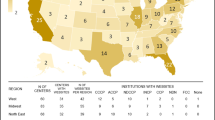Abstract
The unprecedented and growing number of cancer survivors requires comprehensive quality care that includes cancer surveillance, symptom management, and health promotion to reduce morbidity and mortality and improve quality of life. However, coordinated and sustainable survivorship care has been challenged by barriers at multiple levels. We outline the survivorship programs at Northwestern Medicine and the Robert H. Lurie Comprehensive Cancer Center that have evolved over two decades. Our current survivorship clinics comprise STAR (Survivors Taking Action and Responsibility) for adult survivors of childhood cancers; Adult Specialty Survivorship for survivors of breast, colorectal and testicular cancers, lymphomas, and leukemias; and Gynecologic Oncology Survivorship. Care provision models align with general, disease/treatment-specific, and integrated survivorship models, respectively. Reimbursement for survivorship services has been bolstered by institutional budget allocations. We have standardized survivor education, counseling, and referrals through electronic health record (EHR)-integrated survivorship care plan (SCP) templates that incorporate partial auto-population. We developed EHR-integrated data collection tools (e.g., dashboards; SmartForm, and registry) to facilitate data analytics, personalized patient referrals, and reports to the Commission on Cancer (CoC). We report to the CoC on SCP delivery, dietitian encounters, and DEXA scans. For the last decade, our Cancer Survivorship Institute has aligned the efforts of clinicians, researchers, and educators. The institute promotes evidence-based care, high-impact research, and state-of-the-science educational programs for professionals, survivors, and the community. Future plans include expansion of clinical services and funding for applied research centered on the unique needs of post-treatment cancer survivors.
Implications for Cancer Survivors
The survivorship programs at Northwestern Medicine and the Robert H. Lurie Comprehensive Cancer Center underscore the imperative for comprehensive, coordinated, and sustainable survivorship care to address the needs of increasing numbers of cancer survivors, with a focus on evidence-based clinical practices, associated research, and educational initiatives.


Similar content being viewed by others
Data Availability
No datasets were generated or analysed during the current study.
References
Miller KD, Nogueira L, Devasia T, Mariotto AB, Yabroff KR, Jemal A, et al. Cancer treatment and survivorship statistics, 2022. CA Cancer J Clin. 2022;72(5):409–36.
National Cancer Institute Division of Cancer Control & Population Sciences (DCCPS). Definitions (Office of Cancer Survivorship) 2023. https://cancercontrol.cancer.gov/ocs/definitions. Accessed 31 Jul 2023
Alfano CM, Mayer DK, Bhatia S, Maher J, Scott JM, Nekhlyudov L, et al. Implementing personalized pathways for cancer follow-up care in the United States: Proceedings from an American Cancer Society-American Society of Clinical Oncology summit. CA Cancer J Clin. 2019;69(3):234–47.
Halpern MT, Viswanathan M, Evans TS, Birken SA, Basch E, Mayer DK. Models of cancer survivorship care: overview and summary of current evidence. J Oncol Pract. 2015;11(1):e19–27.
American Society of Clinical Oncology. Survivorship Compendium 2023 https://old-prod.asco.org/news-initiatives/current-initiatives/cancer-care-initiatives/survivorship-compendium. Accessed 31 Jul 2023
Garcia SF, Kircher SM, Oden M, Veneruso A, McKoy JM, Pearman T, et al. Survivorship care planning in a comprehensive cancer center using an implementation framework. J Community Support Oncol. 2016;14(5):192–9.
Nekhlyudov L, Mollica MA, Jacobsen PB, Mayer DK, Shulman LN, Geiger AM. Developing a quality of cancer survivorship care framework: implications for clinical care, research, and policy. J Natl Cancer Inst. 2019;111(11):1120–30.
Commission on Cancer. Cancer program standards: ensuring patient-centered care. American College of Surgeons; 2016. https://www.facs.org/media/t5spw4jo/2016-coc-standards-manual_interactive-pdf.pdf. Accessed 4 Aug 2023
Mayer DK, Nekhlyudov L, Snyder CF, Merrill JK, Wollins DS, Shulman LN. American Society of Clinical Oncology clinical expert statement on cancer survivorship care planning. J Oncol Pract. 2014;10(6):345–51.
Commission on Cancer. Optimal Resources for Cancer Care. American College of Surgeons (2023) (Updated February 2023). https://www.facs.org/quality-programs/cancer-programs/commission-on-cancer/standards-and-resources/2020/. Accessed 4 Aug 2023
Hill RE, Wakefield CE, Cohn RJ, Fardell JE, Brierley ME, Kothe E, Jacobsen PB, Hetherington K, Mercieca-Bebber R. Survivorship care plans in cancer: a meta-analysis and systematic review of care plan outcomes. Oncologist. 2020;25(2):e351–72.
Kinahan K, Desai B, Volpentesta M, Klein M, Duffy M, Garcia SF, et al. Implementation of “epic healthy planet” registry for survivorship care coordination. J Clin Oncol. 2021;39(28_suppl):337.
Penedo FJ, Roggenkamp B, Rosenberg CA, Trosman JR, Robinson PA, Knightly E, et al. Utilization of a web-based survivorship and supportive oncology training curriculum for clinicians. J Clin Oncol. 2018;36(7_suppl):19.
Fisher AP, Wortman K, Kinahan K, Kircher SM, Penedo FJ, Weldon C, et al. Piloting a survivorship screening tool in a specialty clinic for survivors of childhood cancers. J Adolesc Young Adult Oncol. 2020;9(3):418–21.
Kinahan KE, Kircher S, Altman J, Rademaker A, Salsman JM, Didwania A, et al. Promoting the shared-care model for adolescent and young adults with cancer: optimizing referrals and care coordination with primary care providers. J Natl Compr Canc Netw. 2017;15(1):38–44.
Garcia SF, Wortman K, Cella D, Wagner LI, Bass M, Kircher S, et al. Implementing electronic health record-integrated screening of patient-reported symptoms and supportive care needs in a comprehensive cancer center. Cancer. 2019;125(22):4059–68.
Garcia SF, Smith JD, Kallen M, Webster KA, Lyleroehr M, Kircher S, et al. Protocol for a type 2 hybrid effectiveness-implementation study expanding, implementing and evaluating electronic health record-integrated patient-reported symptom monitoring in a multisite cancer centre. BMJ Open. 2022;12(5):e059563.
Cella D, Garcia SF, Cahue S, Smith JD, Yanez B, Scholtens D, et al. Implementation and evaluation of an expanded electronic health record-integrated bilingual electronic symptom management program across a multi-site comprehensive cancer center: the NU IMPACT protocol. Contemp Clin Trials. 2023;128:107171.
Acknowledgements
We thank Lori Innocenti and Brenna Murphy for assistance with registry data and Michele Volpentesta and Alpa Patel for electronic health record programming.
Funding
The work presented in this publication was made possible by support from the Robert H. Lurie Comprehensive Cancer Center. Drs. Garcia’s and Kircher’s time was supported, in part, by the National Institutes of Health’s National Institute on Aging, Grant Number P30AG059988.
Author information
Authors and Affiliations
Contributions
The first draft of the manuscript was written by Sofia F. Garcia, PhD, Sheetal M. Kircher, MD, and Mary O’Connor, MS. All authors commented on previous versions of the manuscript. All authors read and approved the final manuscript.
Corresponding author
Ethics declarations
Disclaimer
The content is solely the responsibility of the authors and does not necessarily represent the official views of the National Institutes of Health.
Competing interests
The authors declare no competing interests.
Additional information
Publisher’s note
Springer Nature remains neutral with regard to jurisdictional claims in published maps and institutional affiliations.
Rights and permissions
Springer Nature or its licensor (e.g. a society or other partner) holds exclusive rights to this article under a publishing agreement with the author(s) or other rightsholder(s); author self-archiving of the accepted manuscript version of this article is solely governed by the terms of such publishing agreement and applicable law.
About this article
Cite this article
Garcia, S.F., O’Connor, M., Kinahan, K. et al. Advancing survivorship at a comprehensive cancer center: integrating clinical care, education and research initiatives at Northwestern Medicine and the Robert H. Lurie Comprehensive Cancer Center. J Cancer Surviv 18, 17–22 (2024). https://doi.org/10.1007/s11764-023-01518-7
Received:
Accepted:
Published:
Issue Date:
DOI: https://doi.org/10.1007/s11764-023-01518-7




